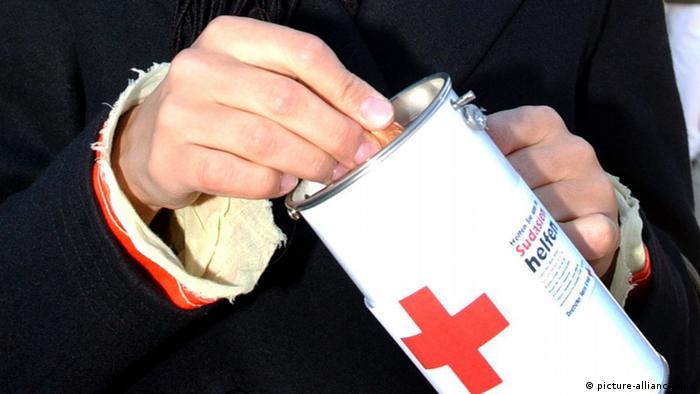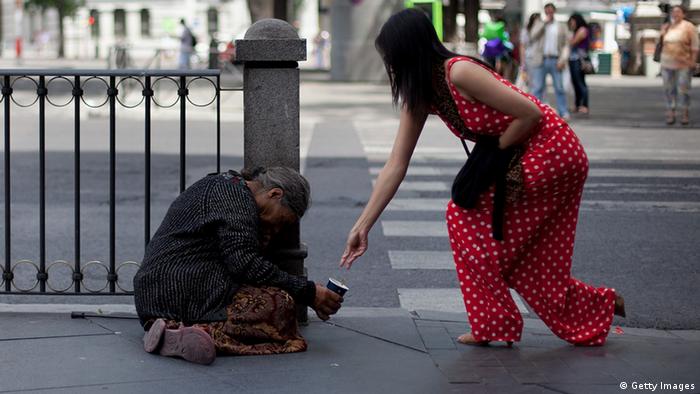

The amount of food aid distributed to people in Europe by the Red Cross has reached levels not seen since World War II. The economic crisis is putting millions at risk of poverty. Bulgaria and Spain are most affected.
Today, the International Red Cross distributes food aid in almost 20 EU member states as result of rising poverty levels.
In Spain alone, some three million people now depend on help to survive. The Red Cross does not just distribute food aid, but also supports the needy with financial aid to pay rent, water and electricity bills."Even people from the middle class who have lost one or two jobs in their households now need our help," said the spokesperson of the Red Cross, Jose Javier Sanchez Espinosa.

A report by the European Commission suggests that young people, migrants and single parents are most at risk of permanent poverty.
"The division of society has to be fought on all levels," said Christoph Butterwegge, a political scientist and poverty researcher, in an interview with DW. "And it starts with introducing a law that guarantees a minimum wage that people can live off."
In Spain, the minimum wage is approximately 750 euros per month. In Bulgaria it drops to 150.
The social gap is widening
Since the beginning of the economic crisis in 2008, the poverty risk has increased in almost half of EU member states, according to the EU. Bulgaria has seen the most drastic developments. In 2011, around half the population was threatened by poverty or social exclusion.
Between European countries there are also severe regional differences. While Germany is relatively unaffected, in Greece, for example, many citizens can no longer afford to pay health insurance, according to Medico International, an aid and human rights organization."Aid organizations step in and help people in need whenever countries are particularly impoverished and lack the resources," said Fredrik Barkenhammar, spokesperson of the German Red Cross, in an interview with DW. "That's a new development in Europe."

For Christoph Butterwege, governments are to blame. "Poverty is eating its way into the very heart of society," he said. "That's because political decisions are made that ease the burden for the higher incomes - the tax burden, for example."
Countries in eastern Europe are generally more affected, he added, because the level of private savings there is lower, and because social security systems there don't have the same capacities as in central and western Europe.
Spainloses out
In some EU countries, the Red Cross has been active for quite some time, launching food aid programs funded by donations.
Last year, rather than solicit money for operations in developing countries, the Red Cross in Spain solicited donations for Spain, itself. To that end, a campaign was launched that asked Spaniards to support their fellow citizens, particularly those most affected by unemployment. Unemployment has been hovering at 26 percent.
Under the slogan "Now more than ever" the campaign aims to collect some 30 million euros for around 300,000 people in need over the next two years. Collection points have been set up all over Spain.
"It's a drop in the ocean," said Christoph Butterwegge. "All it does is ease the burden for some individuals. But it's not a solution to the problem. In order to solve the problem properly, we would need to see a true change in economic, fiscal and social policies."
The European Commission is concerned about the effects that the current economic crisis has on society.
Commission President Jose Manuel Barroso wants to put the consequences of the crisis on the agenda at the EU's upcoming spring summit.
 The amount of food aid distributed to people in Europe by the Red Cross has reached levels not seen since World War II. The economic crisis is putting millions at risk of poverty. Bulgaria and Spain are most affected.
Today, the International Red Cross distributes food aid in almost 20 EU member states as result of rising poverty levels.
In Spain alone, some three million people now depend on help to survive. The Red Cross does not just distribute food aid, but also supports the needy with financial aid to pay rent, water and electricity bills."Even people from the middle class who have lost one or two jobs in their households now need our help," said the spokesperson of the Red Cross, Jose Javier Sanchez Espinosa.
The amount of food aid distributed to people in Europe by the Red Cross has reached levels not seen since World War II. The economic crisis is putting millions at risk of poverty. Bulgaria and Spain are most affected.
Today, the International Red Cross distributes food aid in almost 20 EU member states as result of rising poverty levels.
In Spain alone, some three million people now depend on help to survive. The Red Cross does not just distribute food aid, but also supports the needy with financial aid to pay rent, water and electricity bills."Even people from the middle class who have lost one or two jobs in their households now need our help," said the spokesperson of the Red Cross, Jose Javier Sanchez Espinosa. A report by the European Commission suggests that young people, migrants and single parents are most at risk of permanent poverty.
"The division of society has to be fought on all levels," said Christoph Butterwegge, a political scientist and poverty researcher, in an interview with DW. "And it starts with introducing a law that guarantees a minimum wage that people can live off."
In Spain, the minimum wage is approximately 750 euros per month. In Bulgaria it drops to 150.
The social gap is widening
Since the beginning of the economic crisis in 2008, the poverty risk has increased in almost half of EU member states, according to the EU. Bulgaria has seen the most drastic developments. In 2011, around half the population was threatened by poverty or social exclusion.
Between European countries there are also severe regional differences. While Germany is relatively unaffected, in Greece, for example, many citizens can no longer afford to pay health insurance, according to Medico International, an aid and human rights organization."Aid organizations step in and help people in need whenever countries are particularly impoverished and lack the resources," said Fredrik Barkenhammar, spokesperson of the German Red Cross, in an interview with DW. "That's a new development in Europe."
A report by the European Commission suggests that young people, migrants and single parents are most at risk of permanent poverty.
"The division of society has to be fought on all levels," said Christoph Butterwegge, a political scientist and poverty researcher, in an interview with DW. "And it starts with introducing a law that guarantees a minimum wage that people can live off."
In Spain, the minimum wage is approximately 750 euros per month. In Bulgaria it drops to 150.
The social gap is widening
Since the beginning of the economic crisis in 2008, the poverty risk has increased in almost half of EU member states, according to the EU. Bulgaria has seen the most drastic developments. In 2011, around half the population was threatened by poverty or social exclusion.
Between European countries there are also severe regional differences. While Germany is relatively unaffected, in Greece, for example, many citizens can no longer afford to pay health insurance, according to Medico International, an aid and human rights organization."Aid organizations step in and help people in need whenever countries are particularly impoverished and lack the resources," said Fredrik Barkenhammar, spokesperson of the German Red Cross, in an interview with DW. "That's a new development in Europe." For Christoph Butterwege, governments are to blame. "Poverty is eating its way into the very heart of society," he said. "That's because political decisions are made that ease the burden for the higher incomes - the tax burden, for example."
Countries in eastern Europe are generally more affected, he added, because the level of private savings there is lower, and because social security systems there don't have the same capacities as in central and western Europe.
Spainloses out
In some EU countries, the Red Cross has been active for quite some time, launching food aid programs funded by donations.
Last year, rather than solicit money for operations in developing countries, the Red Cross in Spain solicited donations for Spain, itself. To that end, a campaign was launched that asked Spaniards to support their fellow citizens, particularly those most affected by unemployment. Unemployment has been hovering at 26 percent.
Under the slogan "Now more than ever" the campaign aims to collect some 30 million euros for around 300,000 people in need over the next two years. Collection points have been set up all over Spain.
"It's a drop in the ocean," said Christoph Butterwegge. "All it does is ease the burden for some individuals. But it's not a solution to the problem. In order to solve the problem properly, we would need to see a true change in economic, fiscal and social policies."
The European Commission is concerned about the effects that the current economic crisis has on society.
Commission President Jose Manuel Barroso wants to put the consequences of the crisis on the agenda at the EU's upcoming spring summit.
For Christoph Butterwege, governments are to blame. "Poverty is eating its way into the very heart of society," he said. "That's because political decisions are made that ease the burden for the higher incomes - the tax burden, for example."
Countries in eastern Europe are generally more affected, he added, because the level of private savings there is lower, and because social security systems there don't have the same capacities as in central and western Europe.
Spainloses out
In some EU countries, the Red Cross has been active for quite some time, launching food aid programs funded by donations.
Last year, rather than solicit money for operations in developing countries, the Red Cross in Spain solicited donations for Spain, itself. To that end, a campaign was launched that asked Spaniards to support their fellow citizens, particularly those most affected by unemployment. Unemployment has been hovering at 26 percent.
Under the slogan "Now more than ever" the campaign aims to collect some 30 million euros for around 300,000 people in need over the next two years. Collection points have been set up all over Spain.
"It's a drop in the ocean," said Christoph Butterwegge. "All it does is ease the burden for some individuals. But it's not a solution to the problem. In order to solve the problem properly, we would need to see a true change in economic, fiscal and social policies."
The European Commission is concerned about the effects that the current economic crisis has on society.
Commission President Jose Manuel Barroso wants to put the consequences of the crisis on the agenda at the EU's upcoming spring summit.
No comments:
Post a Comment